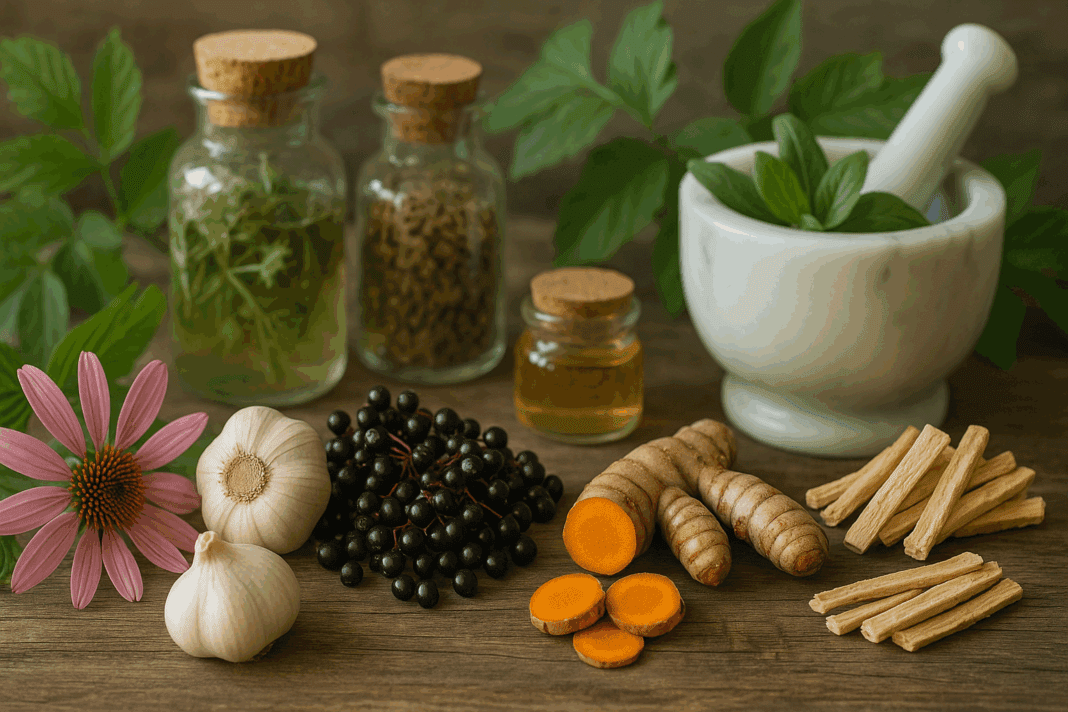Introduction: Understanding Herbal Immune Support in the Modern Wellness Era
In today’s world, where the pursuit of holistic health and natural remedies has become a defining trend, the exploration of immune support through plant-based interventions continues to attract growing interest. Among these interventions, the best herbs for immunity have gained remarkable popularity for their ability to modulate immune responses, enhance resilience against infections, and improve overall well-being without relying solely on pharmaceutical solutions. The increasing integration of traditional herbal wisdom with modern scientific validation has created a compelling case for the role of immune boosting herbs in functional nutrition and wellness protocols. This article offers an in-depth examination of the most powerful, evidence-backed herbs known to strengthen and balance the immune system. From time-tested adaptogens to bioactive-rich botanicals, we will explore the science, efficacy, and practical applications of each herb within the broader context of immune system health.
You may also ike: The Ultimate Guide to Choosing an Effective Immune Support Supplement for Daily Wellness

How the Immune System Works: A Foundation for Herbal Support
Before diving into specific herbs for immune system enhancement, it is essential to understand the intricate workings of our body’s defense system. The immune system comprises an interconnected network of cells, tissues, and organs that work synergistically to detect and neutralize pathogens, ranging from bacteria and viruses to parasites and foreign substances. It functions through two primary mechanisms: innate immunity, which acts as the body’s first line of defense, and adaptive immunity, which develops targeted responses through memory cells. This adaptive arm explains how the body can “remember” past invaders and mount a faster response during subsequent encounters.
Disruption of this sophisticated system can lead to frequent infections, chronic inflammation, or autoimmune responses, underscoring the importance of maintaining immune equilibrium. Environmental stressors, poor diet, sedentary lifestyle, and sleep deprivation can all suppress immune function. Hence, incorporating herbs to boost immune system health becomes more than a supplementary strategy—it becomes a preventive and restorative measure deeply aligned with the principles of functional and integrative medicine.
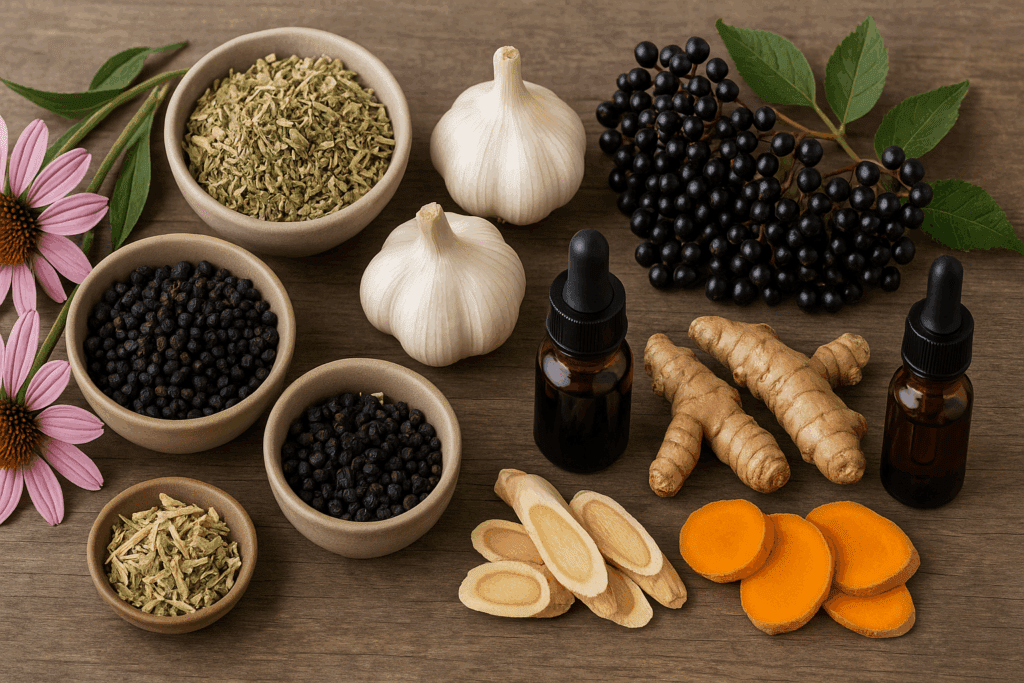
The Best Herbs for Immunity: Backed by Research and Tradition
Among the most respected botanicals in the realm of immune health, certain herbs have consistently demonstrated efficacy through both traditional usage and scientific inquiry. When discussing the best herbs for immunity, echinacea, astragalus, elderberry, garlic, and turmeric frequently rise to the top of the list. These herbs are not only revered in herbalist circles but also validated in numerous peer-reviewed studies for their immunomodulatory, antiviral, and anti-inflammatory properties.
Echinacea, for instance, has long been employed by indigenous cultures in North America to combat respiratory ailments. Its rich profile of alkamides, polysaccharides, and flavonoids contributes to increased white blood cell activity and enhanced cytokine production. Astragalus, a staple in Traditional Chinese Medicine, functions as an adaptogen that enhances resistance to stress while fortifying the immune response. Meanwhile, elderberry’s potent anthocyanins exhibit antiviral properties that make it particularly effective in reducing the duration and severity of cold and flu symptoms. Garlic, with its high allicin content, offers broad-spectrum antimicrobial activity, while turmeric provides curcumin—a bioactive compound known for reducing inflammation and supporting immune modulation. Collectively, these immune strengthening herbs form a powerful pharmacopoeia that can be integrated into daily life for sustained health resilience.
Echinacea: A Classic Among Immune System Boosters Herbs
Echinacea is perhaps one of the most widely recognized herbal remedies for immunity, thanks in part to its long-standing history of use in Native American medicine. Its reputation as one of the best herbs for immune system defense is supported by a wealth of modern studies that highlight its ability to stimulate innate immune responses. Several clinical trials have shown that echinacea extracts can reduce the incidence of upper respiratory infections, particularly in individuals with compromised immunity or high exposure to pathogens, such as schoolteachers and frequent travelers.
The mechanism by which echinacea functions includes enhancing macrophage activity, modulating inflammatory cytokines, and increasing natural killer (NK) cell numbers. Furthermore, its immunomodulatory effects make it particularly effective in supporting both overactive and underactive immune responses. What makes echinacea even more intriguing is its versatility—it can be consumed as a tea, tincture, capsule, or even as a topical application in certain formulations. Whether taken prophylactically or at the onset of symptoms, echinacea has earned its place among the top immune system boosters herbs in both clinical and consumer settings.
Astragalus Root: A Time-Tested Herb to Build Immune System Strength
Astragalus membranaceus has been revered for centuries in Traditional Chinese Medicine as a powerful tonic for longevity, vitality, and disease prevention. Its reputation as one of the most effective herbs to build immune system resilience stems from its profound effects on white blood cell production and antiviral defense. The polysaccharides found in astragalus, particularly astragalosides, have been shown to activate immune cells such as macrophages, dendritic cells, and B lymphocytes.
Unlike stimulatory herbs that act acutely, astragalus works gradually and synergistically to enhance immune function over time. This makes it particularly suitable for individuals recovering from chronic illness or immune suppression due to stress or fatigue. In fact, several in vivo studies have demonstrated that astragalus can increase resistance to infections like influenza and improve outcomes in immunocompromised patients. For those seeking long-term herbal immune support, incorporating astragalus root into daily routines—whether as a decoction, extract, or powder—can be a strategic and sustainable choice.
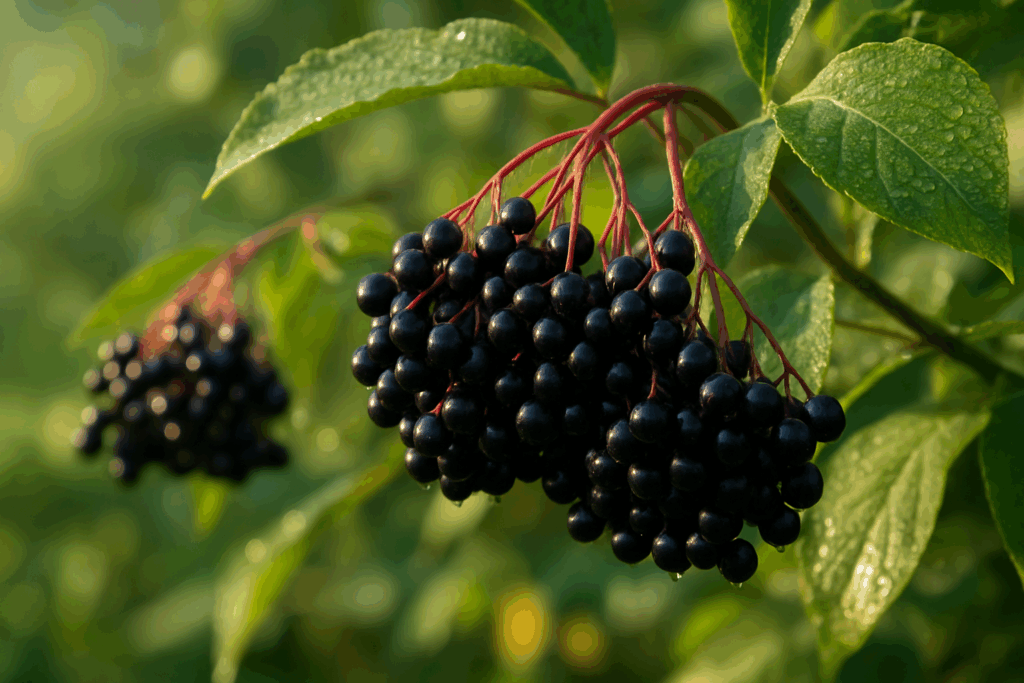
Elderberry: One of the Best Herbs for Immunity During Cold and Flu Season
The dark purple berries of the Sambucus nigra plant have garnered widespread attention in recent years for their role in seasonal immune support. Elderberry has become synonymous with effective, natural antiviral support and is often regarded as one of the best herbs for immunity when facing acute viral infections. Numerous studies support elderberry’s efficacy in reducing flu symptoms and shortening illness duration, primarily due to its rich concentration of anthocyanins and other flavonoids that exhibit direct antiviral activity.
What sets elderberry apart from many herbs is its ability to interfere with viral replication while simultaneously supporting the immune system’s response to infection. In a randomized, double-blind, placebo-controlled study published in the “Journal of International Medical Research,” elderberry extract significantly reduced the duration of flu symptoms compared to placebo. Moreover, elderberry’s antioxidant properties help mitigate inflammation and oxidative stress, further strengthening its role as a holistic immune ally. Elderberry is most commonly consumed as a syrup, lozenge, or gummy, making it accessible and palatable for all age groups. For families and individuals looking for reliable herbal to boost immune system readiness during the colder months, elderberry offers a time-tested, evidence-backed solution.
Garlic: A Functional Food and Herb to Increase Immunity
Garlic, or Allium sativum, bridges the gap between food and medicine with its powerful bioactive compounds and centuries of traditional use. Known for its characteristic pungency and distinctive aroma, garlic is far more than a culinary staple; it is one of the most potent herbs to increase immunity available in the modern diet. Its primary active component, allicin, has been extensively studied for its antimicrobial, antiviral, and immunostimulant properties.
Research published in journals such as “Advances in Therapy” demonstrates that garlic supplementation can reduce the frequency and severity of common colds by enhancing lymphocyte function and increasing the activity of macrophages and NK cells. Furthermore, garlic’s anti-inflammatory properties help modulate immune overreactions that can lead to chronic inflammatory conditions. As part of a functional food approach to health, incorporating fresh or aged garlic into meals not only enriches flavor but also contributes significantly to daily herbal immune support. Supplementation with garlic extracts or capsules offers a more concentrated form for those needing therapeutic dosages, particularly during periods of high stress or exposure.
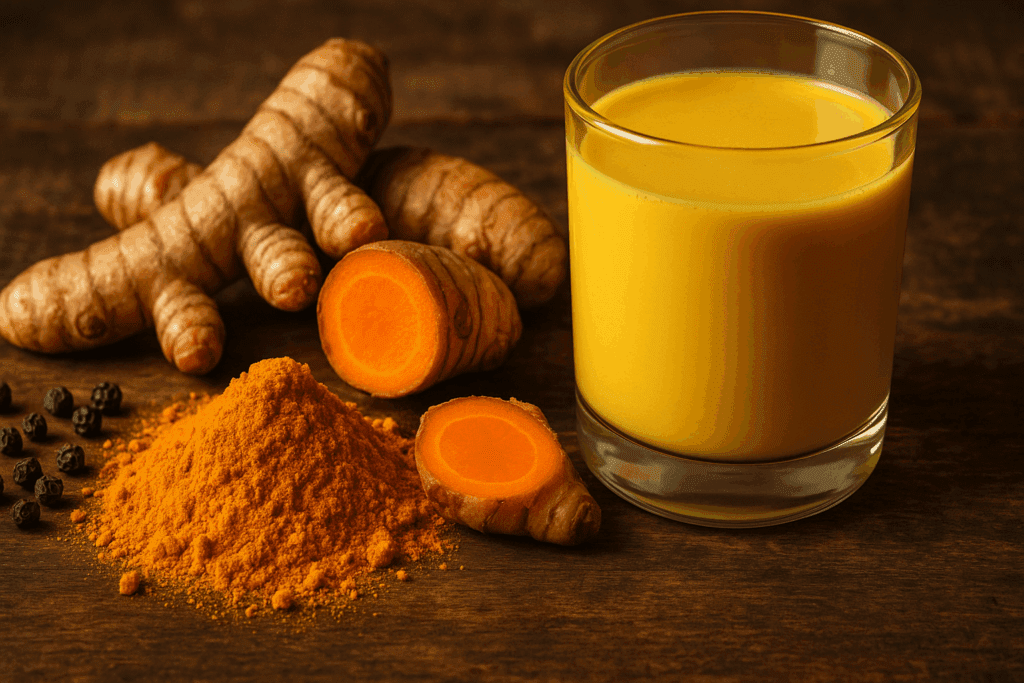
Turmeric and Curcumin: Immune Strengthening Herbs Rooted in Anti-Inflammatory Science
Turmeric (Curcuma longa), a golden-hued root traditionally used in Ayurvedic and Southeast Asian medicine, has captivated modern science with its primary active compound, curcumin. Though often celebrated for its anti-inflammatory properties, curcumin also exerts potent immunomodulatory effects that make turmeric a standout among immune strengthening herbs. It modulates both innate and adaptive immune responses, helping to balance the immune system and reduce overactive inflammation without compromising immune vigilance.
One of the key ways curcumin supports immunity is by regulating the production of cytokines, signaling molecules that coordinate the body’s immune response. In autoimmune disorders or chronic inflammatory conditions, excessive cytokine activity can lead to tissue damage; curcumin helps attenuate this overactivity. Additionally, curcumin has been shown to increase antibody responses and improve the efficiency of immune surveillance. Its bioavailability can be enhanced with black pepper extract (piperine) or by using liposomal formulations, which makes supplementation more effective. For those exploring herbs improve immune system health through anti-inflammatory pathways, turmeric provides a uniquely integrative approach.
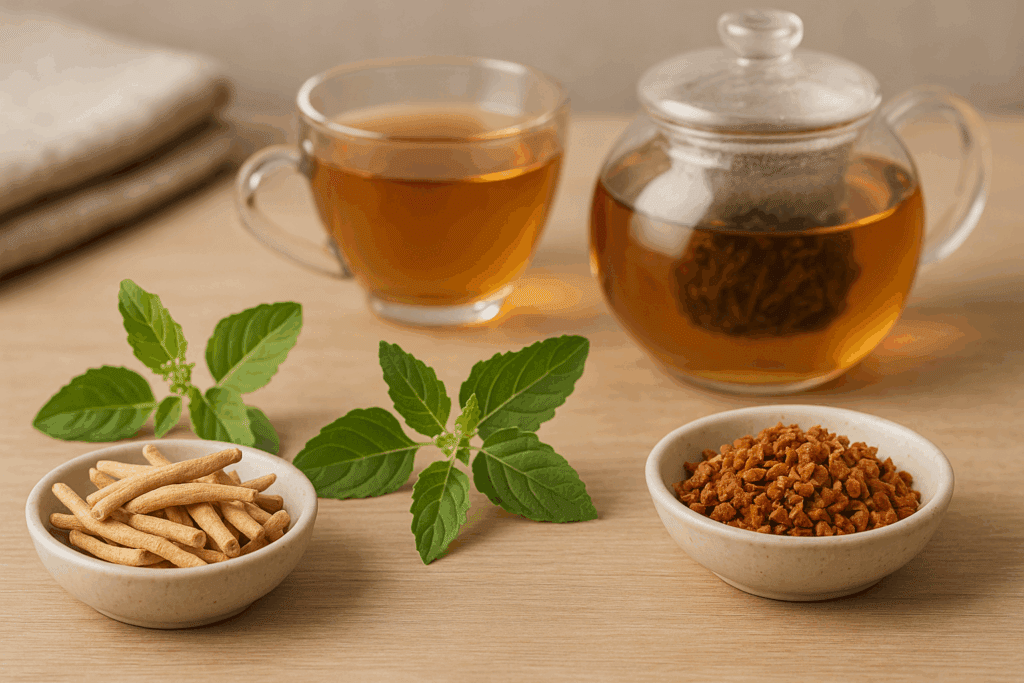
Exploring Adaptogens as Herbs to Boost Immune System Resilience
Adaptogens are a special class of herbs known for their ability to help the body adapt to stress, restore balance, and improve physiological resilience. These properties make adaptogens especially valuable as herbs to boost immune system robustness over the long term. Among the most studied adaptogens in this category are ashwagandha, holy basil (tulsi), and Rhodiola rosea. While each has distinct mechanisms of action, they all contribute to immune modulation through stress reduction and adrenal support.
Ashwagandha (Withania somnifera) reduces cortisol levels and improves immune function by increasing white blood cell count and enhancing macrophage activity. Holy basil, with its high concentration of eugenol and other antioxidants, exerts both antibacterial and antifungal effects while also calming the nervous system. Rhodiola supports immune function by enhancing mitochondrial efficiency and reducing stress-induced immune suppression. When used in combination or rotation, these adaptogens offer a strategic method of enhancing overall immunity while supporting mental clarity and emotional resilience. These multifaceted benefits make adaptogens a cornerstone in holistic protocols focused on herbs to build immune system strength from the inside out.
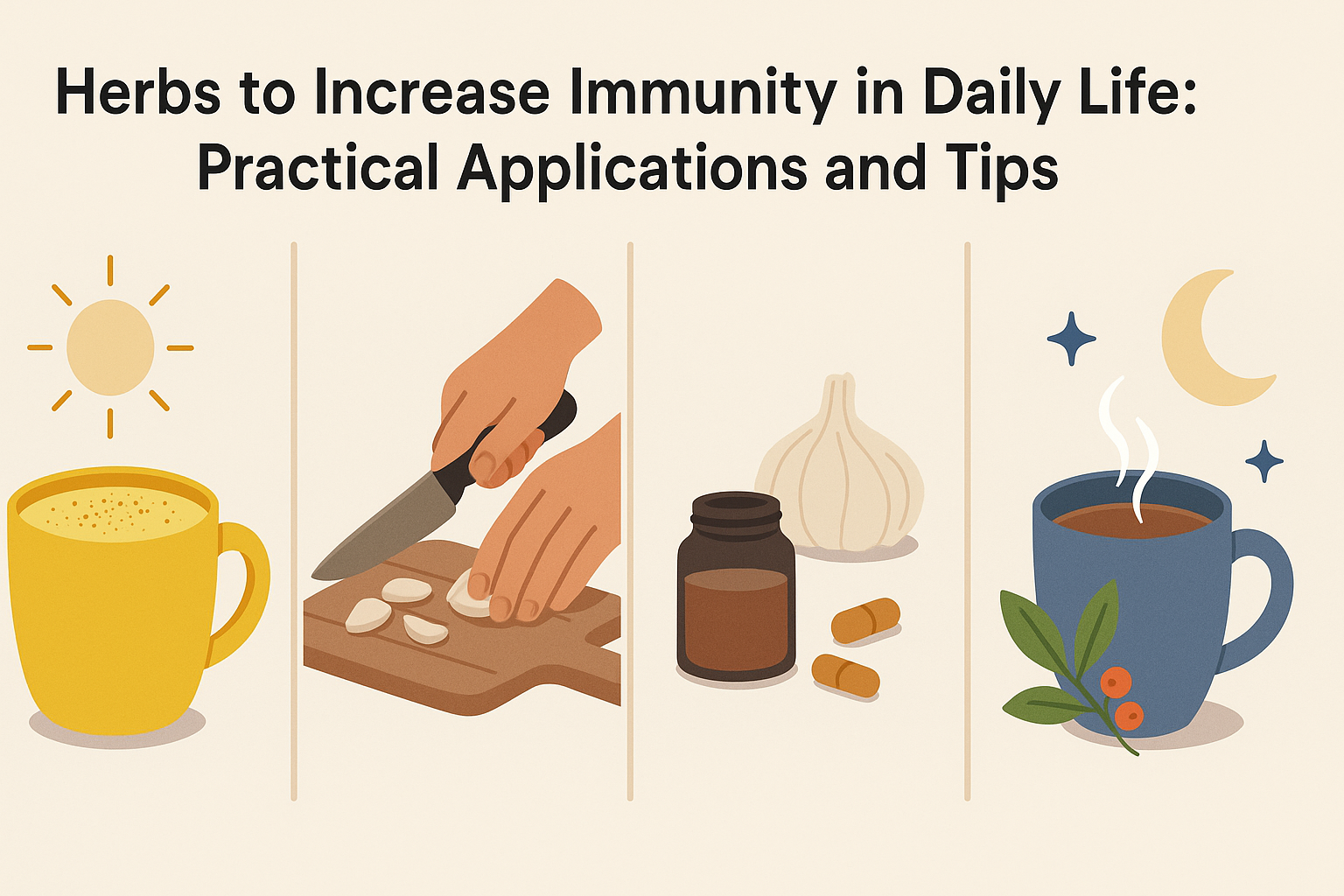
Herbs to Increase Immunity in Daily Life: Practical Applications and Tips
Integrating herbs to increase immunity into daily life does not require complex regimens or exotic ingredients. In fact, many immune boosting herbs can be seamlessly incorporated into cooking, beverages, and routine wellness rituals. Simple teas made with ginger, licorice root, or lemon balm can be soothing and immunostimulatory. Culinary herbs like oregano, thyme, and rosemary are rich in volatile oils that offer antimicrobial protection while enhancing meal flavor.
For more structured approaches, standardized herbal supplements can provide targeted dosages of key immune herbs. When choosing supplements, look for those that are third-party tested and clearly label active constituents such as allicin in garlic or curcuminoids in turmeric. It’s also advisable to rotate herbs seasonally to prevent adaptation and ensure a broad spectrum of immune support. Creating daily rituals, such as morning turmeric lattes or evening ashwagandha tonics, can make herbal intake feel less like a chore and more like an act of self-care. Ultimately, the key to using herbs for immunity lies in consistency, personalization, and quality sourcing—principles that align closely with the emerging ethos of functional nutrition.
The Best Herbs for Immune System Longevity and Aging Gracefully
As we age, immune function naturally declines—a phenomenon known as immunosenescence. This decline contributes to increased susceptibility to infections, slower wound healing, and diminished vaccine efficacy. Fortunately, certain immune system boosters herbs can help counteract these age-related changes and support graceful aging. Reishi mushroom, for example, has been shown to enhance immune surveillance, increase natural killer cell activity, and improve the body’s ability to fend off pathogens.
Other herbs such as cat’s claw (Uncaria tomentosa), andrographis, and schisandra offer a unique combination of antioxidant, anti-inflammatory, and immunostimulant properties. These herbs not only support immune function but also contribute to cellular health and stress resilience—two key factors in longevity. For older adults seeking herbal to boost immune system health, incorporating these botanicals into a structured supplementation plan can offer protective benefits without the risks often associated with polypharmacy. Their role in promoting immunological youthfulness positions them as valuable tools in both preventative and therapeutic frameworks.
Frequently Asked Questions (FAQ): The Ultimate Guide to Immune-Boosting Herbs
1. What is the most effective way to use the best herbs for immunity in daily routines?
Incorporating the best herbs for immunity into daily life doesn’t always require supplements or complex tinctures. A highly effective strategy is culinary integration—adding immune boosting herbs like garlic, oregano, and turmeric to soups, stews, and stir-fries enhances both flavor and health benefits. Herbal teas made from astragalus, elderberry, or holy basil are another practical method that combines hydration with therapeutic support. Infused honeys and vinegars made with herbs for immune system health are gaining popularity as both functional condiments and wellness boosters. Establishing consistent morning or evening routines, such as drinking a warm adaptogen-based tea or taking a standardized capsule, helps maintain long-term herbal immune support while making the practice feel intuitive and sustainable.
2. Are there specific immune boosting herbs that work best for children or older adults?
Yes, certain herbs are better suited for specific age groups due to differences in metabolism, immune function, and safety profiles. For children, mild and gentle herbs for immunity like elderberry and chamomile are well tolerated and effective during cold and flu season. Glycerite tinctures or syrups offer a child-friendly format. Older adults, on the other hand, often benefit from immune strengthening herbs like reishi mushroom and astragalus, which support age-related immune decline and oxidative stress. Both age groups should prioritize herbs that enhance immune resilience without overstimulating the system, and consulting a qualified herbalist or healthcare provider ensures tailored recommendations for these sensitive populations.
3. Can immune boosting herbs be combined with prescription medications?
While many herbs improve immune system function, they can sometimes interact with prescription medications, particularly those that modulate immune activity or affect liver enzyme pathways. For example, echinacea may influence the metabolism of certain drugs processed by the liver, while garlic could enhance the effects of anticoagulants. It’s crucial to evaluate possible herb-drug interactions with a licensed healthcare provider, especially when dealing with immunosuppressive therapy, autoimmune medications, or chronic conditions. However, many individuals successfully use herbs to boost immune system performance in tandem with conventional medicine when done under professional supervision. An integrated approach maximizes the benefits of both systems while minimizing risks.
4. What are the most research-supported herbs to build immune system resilience over time?
When it comes to long-term immune resilience, a few key herbs stand out based on clinical evidence and traditional use. Astragalus and reishi mushroom are two of the most thoroughly researched immune system boosters herbs, recognized for enhancing immune surveillance and resistance to infections. Holy basil, also known as tulsi, provides adaptogenic and antioxidant effects that contribute to sustained immune balance. Siberian ginseng and Rhodiola rosea support stamina and stress management, both of which indirectly help maintain immune health. These herbs, when taken regularly and in standardized doses, help train the immune system to respond efficiently to pathogens while reducing chronic inflammation associated with immune dysfunction.
5. How do lifestyle factors influence the effectiveness of herbs to increase immunity?
Herbs to increase immunity function best when paired with healthy lifestyle habits. Sleep quality, physical activity, hydration, and balanced nutrition all play pivotal roles in modulating immune responses. Chronic stress and poor sleep, for example, can blunt the effects of even the best herbs for immune system enhancement. Supporting herbs like ashwagandha or lemon balm can help balance cortisol, but they are more effective when stress-reduction techniques like meditation or breathwork are practiced concurrently. Nutrient-dense foods rich in zinc, vitamin D, and polyphenols synergize with immune boosting herbs, creating a multi-layered defense system rooted in both internal and external wellness.
6. What is the difference between immune stimulants and immune modulators in herbal to boost immune system applications?
Understanding the distinction between immune stimulants and immune modulators is essential when selecting herbs to boost immune system function. Immune stimulants like echinacea and elderberry activate immune cells quickly, making them ideal for short-term use during acute infections. In contrast, immune modulators such as reishi and turmeric help regulate immune responses over time, reducing the risk of overactivation that could lead to inflammation or autoimmunity. Herbs improve immune system performance differently depending on their classification, and combining both types can provide immediate and long-lasting benefits. For individuals with autoimmune conditions, modulators are generally preferred to avoid exacerbating underlying imbalances.
7. How do seasonal changes affect the use of the best herbs for immunity?
Seasonal fluctuations impact the immune system and can inform which herbs are most appropriate throughout the year. During fall and winter, immune boosting herbs like elderberry, garlic, and astragalus are typically emphasized due to increased exposure to respiratory infections. In spring, herbs that support detoxification and reduce inflammation—such as dandelion root or nettle—help reset the immune system after seasonal illnesses. Summer may call for cooling, hydrating herbs like lemon balm and hibiscus that support immune function while managing heat-related stress. Adapting herbal regimens to the seasons ensures that the best herbs for immunity are used in alignment with environmental needs and biological rhythms.
8. Are there emerging trends or innovations in immune strengthening herbs?
The field of herbal medicine is constantly evolving, and recent trends highlight new delivery systems and compound extractions that enhance efficacy. Liposomal herbal supplements and nanoemulsion formulations increase bioavailability of immune strengthening herbs like curcumin and quercetin. Fermented herbs, such as fermented echinacea or garlic, offer improved digestibility and enhanced bioactivity due to probiotic synergy. Additionally, integrative health practitioners are increasingly blending traditional Chinese, Ayurvedic, and Western herbs for immune system optimization, creating hybrid formulas that address multiple aspects of immunity. Innovations in mushroom extracts—especially beta-glucan concentrates from shiitake and maitake—also represent a growing frontier in the field of herbal immune support.
9. Can herbs for immunity help manage chronic immune-related conditions?
Although herbs are not a replacement for medical treatment, they can serve as supportive therapies for chronic immune-related disorders like autoimmune diseases, allergies, or frequent viral infections. For instance, turmeric and boswellia are used to modulate inflammatory responses in conditions such as rheumatoid arthritis or lupus. Reishi and astragalus may support individuals with chronic fatigue syndrome by enhancing mitochondrial function and cellular immunity. Herbs for immune system balance can also reduce flare-ups and improve quality of life when used in conjunction with dietary and lifestyle interventions. As always, it’s essential to work with healthcare professionals when integrating herbs into complex medical regimens to ensure compatibility and effectiveness.
10. What are the risks of using too many herbs to boost immune system activity?
While using herbs to boost immune system health can be beneficial, excessive or inappropriate use can lead to overstimulation or adverse effects. High doses of potent herbs like echinacea, garlic, or oregano oil may cause gastrointestinal upset, skin rashes, or hormonal imbalances in sensitive individuals. Overuse of immune stimulants during non-infectious periods may also lead to immune fatigue or trigger autoimmune responses in predisposed people. Rotating herbs, taking periodic breaks, and sticking to recommended dosages minimizes these risks while preserving efficacy. It is always best to personalize herbal protocols with professional guidance, especially when using multiple immune system boosters herbs simultaneously or alongside medications.
Conclusion: Embracing the Science and Tradition Behind the Best Herbs for Immunity
In a world where immune resilience is more critical than ever, turning to the best herbs for immunity offers a holistic, sustainable, and scientifically validated path toward better health. The convergence of traditional herbal wisdom with rigorous scientific research has unveiled a diverse array of herbs capable of enhancing immune function, reducing infection risk, and supporting overall vitality. From echinacea’s rapid-acting defense to astragalus’s long-term tonic effects, and from elderberry’s antiviral prowess to turmeric’s anti-inflammatory precision, each herb offers a unique mechanism of action that contributes to the broader landscape of immune health.
What makes these herbs particularly powerful is their ability to integrate seamlessly into everyday routines while delivering measurable physiological benefits. Whether used as teas, tinctures, capsules, or culinary ingredients, immune boosting herbs provide accessible and effective ways to build a resilient immune system. Moreover, the thoughtful use of herbal immune support aligns with the growing demand for personalized, evidence-based, and natural approaches to wellness. By understanding the strengths and applications of these herbs—and honoring both their cultural origins and scientific legitimacy—we can take meaningful steps toward a more robust, balanced, and health-conscious future.
Further Reading:
From Turmeric To Chyawanprash: 10 Natural Foods To Strengthen Your Body’s Defences


